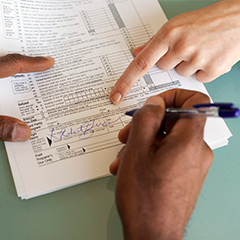New Version of Form I-9 Issued
January 16, 2017 | Business Plans
 Recently, a new version of Form I-9, “Employment Eligibility Verification,” has been issued by the U.S. Citizenship and Immigration Services (USCIS). It’s dated November 14, 2016 and has an August 31, 2019 expiration date. Beginning on January 22, 2017, employers must use the new form, but until then, the version dated March 8, 2013 may also be used.
Recently, a new version of Form I-9, “Employment Eligibility Verification,” has been issued by the U.S. Citizenship and Immigration Services (USCIS). It’s dated November 14, 2016 and has an August 31, 2019 expiration date. Beginning on January 22, 2017, employers must use the new form, but until then, the version dated March 8, 2013 may also be used.
Changes to the Form
There have been several changes made to the new form:
- Section 1 (Employee Information and Attestation) now asks for “other last names used” rather than “other names used,” and streamlines the certification process for certain foreign nationals.
- The addition of prompts to ensure information is entered correctly.
- The ability to enter multiple preparers and translators.
- A dedicated area for including additional information rather than having to add it in the margins.
- A supplemental page for the preparer or translator.
In line with other USCIS forms, the instructions have been separated from the form and include specific instructions for completing each field.
USCIS says that the new version of Form I-9 is easier to complete on a computer. Enhancements include easy access to the full instructions, on-screen instructions for each field, drop-down lists and calendars for filling in dates, and an option to clear the form and start over. When the employer prints the completed form, a quick response (QR) code is automatically generated, which can be read by most QR readers.
About Form I-9
Every employer that recruits, refers for a fee, or hires an individual for employment in the United States is required by federal law to complete Form I-9. The form helps employers verify an employee’s identity and employment authorization. This is done by employers physically examining acceptable documents including drivers’ licenses and eligible ID cards. I-9 forms can be filed electronically or on paper.
In November 1986 when Congress passed the Immigration Reform and Control Act, Form I-9 requirements were established. That law prohibits employers from hiring people, including U.S. citizens, for employment in the United States without verifying their identities and employment authorization on Form I-9.
